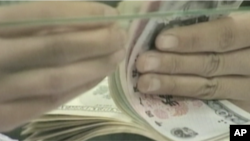On Saturday, the People's Bank of China announced plans to allow greater flexibility in exchange rates, appearing to buckle under criticism that its currency policies keep the yuan undervalued against the dollar to give Chinese exporters an unfair advantage in overseas markets.
Since that decision, the yuan advanced Monday against the dollar to its highest level in over four years... but then edged lower on Tuesday in global markets.
Despite the new policy, China is likely to move ahead very cautiously, according to Christopher McNally, who specializes in Chinese capitalism and is a fellow at the Hawaii-based East-West Center.
"It's certainly somewhat positive that they're finally moving in a direction of sensibility and the move... [Monday] was one of the largest. That showed that the Chinese at least symbolically wanted to show the world that they're willing to move and appreciate the currency some more. That is the positive side of things. [But] the appreciation of the yuan, or renminbi, is going to be very gradual," McNally said.
However, others say the Chinese have done too little. Research fellow Derek Scissors at the Washington-based Heritage Foundation said the move is being downplayed in China itself and was done, in his opinion, for political reasons in advance of this weekend's meeting of the G20 in Canada.
"I think the timing of this is pretty clear. The way the G20 discussion was evolving, it was all going to be about the yuan, and they did not want that," said Scissors. "So, this way they can say, well, you know, we took a step in the right direction -- you may not think we took enough of a step in the right direction, but we took a step in the right direction."
Scissors said that leaves an opening for Beijing to come back and say, "What have [you] done, which is certainly fair in pointing to the United States. So, the timing has do with 'we'd rather not to have had to do anything, but we don't want to be under this ugly spotlight, so we'll try to distract people a little bit, but not unreasonably with a change that really doesn't commit us to very much.'"
Economist McNally agreed the Chinese announcement was politically-timed, but he added there is more behind the decision.
"It probably has two sides to it. One is reaction from outside pressure, not only the United States, but also from other trading partners like India, the European Union, even Russia, and a lot of Southeast Asian countries who have seen their currencies actually appreciate vis-a-vis the yuan, or at least stay stable. And, this gives China an immense competitive advantage. So, the Chinese do want to assuage concerns, especially in advance of the G20, and I'm sure they have some astute political analysts who know that, if they do not move in the next few weeks, Congress could become quite angry and start to impose trade sanctions. So yes, this is somewhat a reaction to outside pressure," said McNally.
He added, "It is also a reaction to what is happening inside the Chinese domestic economy because inflationary pressures, although not very high, are there and the Chinese would like to have more flexibility in their currency exchange rate to forestall inflationary pressures, as well as forestall the 'hot money' inflows, you know, large amounts of money that have been flowing into China trying to take advantage of the appreciation."
Jon Huntsman, the U.S. Ambassador to China, Jon Hunstman, said the Chinese financial decision takes an irritant in U.S.-Sino relations off the table. Derek Scissors of the Heritage Foundation believes the only thing that will make a difference is for China to let their currency find its place naturally against all of the world's currencies.
"I agree with Ambassador Huntsman that this buys some space, in the short term, for better Sino-American relationd," said Scissors. "But, until China floats and we have no sign that they're moving in that direction, this is going to crop up again and again and again."
China Allows Fluctuation of Yuan, But How Far Will Beijing Go?




